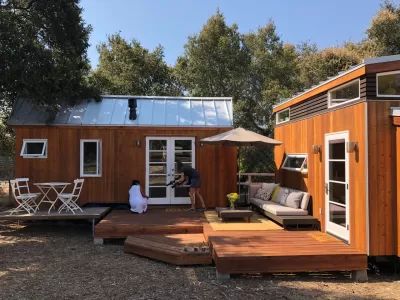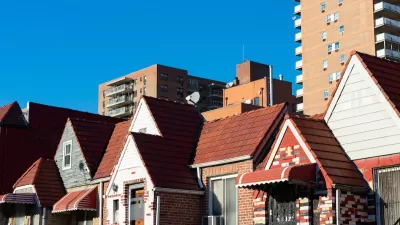A few jurisdictions have gone beyond conformity with state law to encourage the construction of accessory dwelling units in the state of California, like in San Diego.

Cinnamon Janzer reports on San Diego County's approach to Accessory Dwelling Units, deployed last fall to further support ADU development beyond the allowances made by state law, by "offering free, pre-approved ADU floor plans and waiving $15,000 in permit and development fees to reduce the costs associated with construction."
Janzer quotes Gary Geiler, the development services director for the city of San Diego, to explain what the city is doing to support ADU construction in a city with notoriously high housing prices, much like the rest of the cities in the state.
“We’ve had companion unit regulations on the books since the 90s,” Geiler says, “but they were more design-oriented and required conditional use permits. We didn’t get a lot of applications, maybe 10 in a year.” These days, those numbers are way up. “In 2017… we got an increase of over 100 applications that first year, so we said, ‘OK, we’re onto something here.’” The city has since done away with even more fees. “The applications increased even further,” Geiler says. “We had probably over 300 applications in 2018 and over 600 in 2019. So far we have about 200 new units this year and about 1,000 units applied for.”
Janzer also speaks with Caitlin Bigelow, a resident of the nearby city of La Mesa, who started the company Maxable to offer ADU consulting and services to Californians, who finds room for improvements for both the city and the county's efforts, finding fault especially with the pre-approved floor plans, and points to the example of San Jose for a model for improvement.
"She’d like to see San Diego take an approach more like San Jose’s where the city opened up the plan design process to local design professionals and created something of a library of plan choices that offer more variety to meet the needs of different homeowners," reports Janzer.
FULL STORY: San Diego Aims to Spur More Backyard Homes with Free Floor Plans

Planetizen Federal Action Tracker
A weekly monitor of how Trump’s orders and actions are impacting planners and planning in America.

Congressman Proposes Bill to Rename DC Metro “Trump Train”
The Make Autorail Great Again Act would withhold federal funding to the system until the Washington Metropolitan Area Transit Authority (WMATA), rebrands as the Washington Metropolitan Authority for Greater Access (WMAGA).

DARTSpace Platform Streamlines Dallas TOD Application Process
The Dallas transit agency hopes a shorter permitting timeline will boost transit-oriented development around rail stations.

Downtown Los Angeles Gears Up for Growth
A new report highlights Downtown L.A.’s ongoing revival through major housing projects, adaptive reuse, hospitality growth, and preparations for global events in the years ahead.

Supreme Court Landlord Appeal Case Could Overturn Tenant Protections
A legal case claiming that COVID-era eviction moratoriums were unconstitutional could spell trouble for tenant protections.

Texas Moves to Curb Orphan Wells, But Critics Say Loopholes Remain
A proposed state law would shift financial responsibility for sealing unused drilling sites from the public to energy operators, though some advocates question its effectiveness due to industry-backed exemptions.
Urban Design for Planners 1: Software Tools
This six-course series explores essential urban design concepts using open source software and equips planners with the tools they need to participate fully in the urban design process.
Planning for Universal Design
Learn the tools for implementing Universal Design in planning regulations.
Municipality of Princeton
Roanoke Valley-Alleghany Regional Commission
City of Mt Shasta
City of Camden Redevelopment Agency
City of Astoria
Transportation Research & Education Center (TREC) at Portland State University
US High Speed Rail Association
City of Camden Redevelopment Agency
Municipality of Princeton (NJ)





























